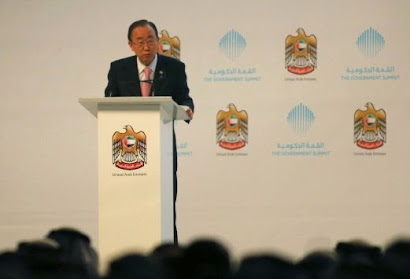 |
| Thailand received 35 million tourists last year, of whom nearly 10 million hailed from China, according to official data (AFP Photo/Lillian SUWANRUMPHA) |
Hordes of
tourists clamber across the white sand with selfie sticks as Thai park rangers
wade into turquoise waters to direct boats charging into the cliff-ringed cove.
Made famous
by the 2000 movie "The Beach" starring Leonardo DiCaprio, Maya Bay on
the western Thai island of Koh Phi Phi Ley is now a case study in the ruinous
costs of runaway tourism, swamped by up to 4,000 daily visitors.
"There
is too many people here, it's bad," lamented Saad Lazrak, a 61-year-old
from Morocco, as crowds around him swallowed the stretch of sand encircled by
an amphitheatre of limestone cliffs.
Across the
region, Southeast Asia's once-pristine beaches are reeling from decades of
unchecked tourism as governments scramble to confront trash-filled waters and
environmental degradation without puncturing a key economic driver.
Thailand's
Maya Bay will be off limits for four months from June to September, officials
announced last month, in a bid to save its ravaged coral reefs.
In the
Philippines, President Rodrigo Duterte ordered this month the Boracay beach
resort closed to tourists for up to six months from April 26, describing the
destination as a "cesspool" tainted by sewage dumped directly into
the sea.
Indonesian
officials, meanwhile, declared a "garbage emergency" last year
swamping a six-kilometre stretch of coast along the island of Bali.
The
island's grim coastal pollution was highlighted in March by British diver Rich
Horner's viral video of swimming through a sea of trash swirling off shore.
"Plastic
bags, more plastic bags, plastic, plastic, so much plastic!" Horner said
in a Facebook post that has been viewed more than a million times.
 |
Thailand's
Maya Bay will be off limits for four months from June to September
in a bid to
save its ravaged coral reefs (AFP Photo/Lillian SUWANRUMPHA)
|
Breathing
space
Conservationists
and governments are worried about the health of coral reefs, which are in a
dire state globally due to climate change and rising sea temperatures.
When
exposed to warmer waters, they shed the algae that dazzle the eye and are vital
to marine eco-systems, leaving the corals diseased or bone-white in a process
called bleaching.
Environmental
stress, including pollution, human contact and exposure to plastics that comes
with mass tourism are also major threats to reefs that are part of the draw for
snorkellers and scuba-divers.
"Tourism
has a series of detrimental effects on coral health," said Eike Schoenig,
a Thailand-based marine biologist at the Center for Oceanic Research and
Education.
Countries
in Southeast Asia are looking to stem the threats without cutting off the cash
flow of a regional tourism boom, led by China, the top source market for
travellers to the region.
Thailand
received 35 million tourists last year, of whom nearly 10 million hailed from
China, according to official data.
But what is
good for business can be bad for beaches.
Songtam
Suksawang, Thailand's National Park Office Director, told AFP he personally
inspected the beach at Maya Bay and said it "must definitely be
(temporarily) closed" in order to rehabilitate it.
He said
authorities are discussing new rules once the shut-down is lifted, such as
restrictions on the number of daily visitors, better regulation of boats and a
higher entrance fee.
Tourism costs
Tourism costs
Thailand is
also conducting studies on six other marine parks, while the Philippines is
weighing action on other top destinations buckling under mass tourism.
But
governments are wary of curtailing an industry that creates jobs and buoys
economies.
Spending on
travel and tourism contributed nearly $136 billion to the region's GDP in 2017,
a figure forecast to rise to $144 billion this year, according to the World
Travel & Tourism Council.
The cost of
the closures is already being felt in the Philippines, where hundreds of
Boracay hotels and tour companies are facing steep losses from cancelled rooms,
flights and other bookings.
But some
countries are not taking such dramatic steps.
In
Indonesia, the tourism ministry said there were no plans to close Bali or any
other holiday destination in the archipelago, although it acknowledged that
pockets of the tropical paradise were under strain from heavy tourism.
"Shut
down Bali? I don't think we will need to do that yet," said ministry
spokesman Guntur Sakti. "Bali is the centre of Indonesian tourism."
In fact,
Indonesia has identified 10 other destinations where it is trying to boost
visitors and replicate Bali's success, including neighbouring island Lombok and
Lake Toba in Sumatra.
Experts are
also sceptical that short shut-downs will have lasting effects.
 |
Fire
dancers perform for tourists on the southern Thai island of Koh Phi Phi, which
is swamped by up to 4,000 daily visitors (AFP Photo/Lillian SUWANRUMPHA)
|
"Bottom
line is that temporarily closing the beach is probably not the optimal solution
to these problems. It only take a day for a bunch of incompetent snorkellers to
trash a small reef," said Andrew Baird from the ARC Centre of Excellence
for Coral Reef Studies in Australia.
In
Thailand, the government hopes to draw people to lesser known beaches.
"We
are working very hard to spread people out, not to go to one condensed
area," said Thon Thamrongnawasawat, a marine expert working with the parks
and tourism authorities.
Travellers
to Maya Bay might like the idea.
"It's
very touristy. There wasn't a patch of sand that didn't have people laying down
on it, taking photos," Oliver Black, a 22-year-old tourist, said of his
afternoon at the destination.
As for his
thoughts on the looming closure?








No comments:
Post a Comment